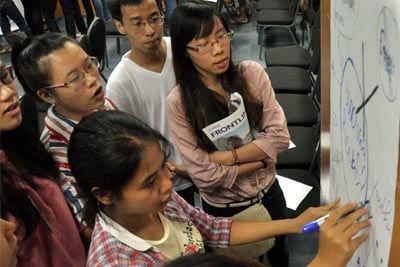
- Committees and Advisory Boards
-
There are many opportunities for people to get involved in state, local or organizational advisory boards or committees. Counties, state agencies, hospital and large providers are often all looking for people to get involved. Unfortunately, they may conduct their work at times, places, and in ways that do not work well for people or families. They also may not see co-creation (with authentic power) as the objective. However, it’s still important to let people know about these opportunities. You can help them advocate for more involvement and a stronger voice when needed. You can participate in designing structures and practices of councils and committees affiliated with your organization. This helps make sure your organization’s councils or boards reflect good practices. These groups often need more dedicated person and family-centered professionals to participate as well. There are often opportunities to make comments or serve on workgroups through the Olmstead Subcommittee and Implementation Office of the Minnesota Olmstead Plan.
- Hiring for Diversity
-
It’s a common concern for people of color, immigrants, and people from other underserved groups (veterans, people from rural or LGBTQIA communities), that they do not see people who look like them or have shared experiences represented in the professionals and practitioners in many metal health services. One of the most powerful ways to co-create is to make room in leadership through employment for people who have lived experience and come from communities that are not well served. Minnesota supports this by having peer support specialists for adults and family peer support specialists as Medicaid reimbursable options in mental health services. In addition, organizations may want to actively recruit clinical or other staff that come from populations that are typically underserved. They may also want to consider proactively contracting with organizations that are owned and operated by underrepresented groups.
However, it’s important to not assume that hiring alone will solve the problems of meeting the needs of communities. Just as with any form of co-creation, it’s important not to hire a person without a defined role just because they represent a constituency you are trying to reach. They will not feel valued and are unlikely to stay or perform well. This is another form of tokenism that causes more harm than good. You also want to make sure employment opportunities are welcoming and people are included. This may take more work than expected. It’s important that all staff receive training on diversity and equity issues, especially management.
- Surveys and Focus Groups
-
Another common ways systems and organizations try to gather information is through surveys or focus groups. They may be with participants and families, community members, or employees. These processes often seem simple and easy to apply. However, they often do not engage people of color or other under-represented groups well. This can be due to cultural and linguistic differences, including a lack of trust in the process. Being transparent and honest in how the information will be used and when it will be used can help. Steps must also be taken to make sure focus groups are safe environments for people. In addition, considerations of timing, location, group make-up, and preparation must all be considered.
- Use of PCT Skills
-
Many organizations have actively participated in Person-Centered Thinking (PCT) training. This includes some divisions of the Department of Human Services and several lead agencies in Minnesota. This training provides a variety of tools and strategies for working with individuals. But it also supports trainees to learn to use the tools at an organizational or system level. Many employees or employee groups may already be using these approaches. Some of these include: learning logs, working/not working or 4 + 1 Question analysis; or donuts and matching. These skills and tools can help organizations track and analyze issues and barriers. The skills can also help them recognize which are things they can handle directly, with supervisory support, or need to advocate for with the broader system. (Called level 1, 2 or 3 changes in the PCT curriculum.) Supporting and building off of these types of initiatives can accelerate co-creation.
- Connecting to Advocates
-
Connecting to established advocacy group in your area is an important part of outreach and collaboration. It can lead to more effective co-creation opportunities. Minnesota has a number of these organizations. Having a list of the local contacts with you can help you get people connected. As they become more confident and connected they may find more opportunities to contribute in greater system advocacy. People should also understand what legal protections there are for them in the system. Then they will know who to contact if they feel they have not been treated fairly. Local protection and advocacy offices or ombudsmen contacts should be part of any professional’s set of resources. These organizations may be able to connect you to people who are eager and ready to participate in co-creation and similar activities. They may also offer training to professionals. Finally, they may be able to collaborate on advocacy issues within the system.
- Co-Create One on One
-
Every professional has the opportunity to co-create with individuals they support and their families when appropriate. Being open to the person’s authentic experience while developing plans and working toward recovery is very important. The stories of success help fuel new generations of effective co-creators.